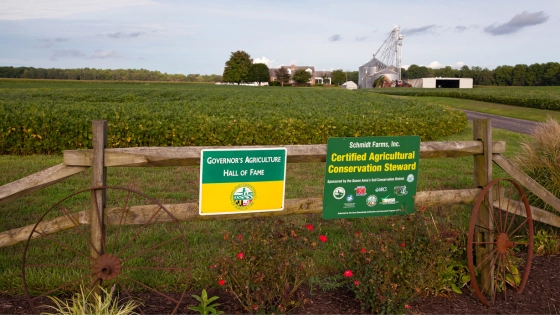 Have you ever bought something from the grocery store just because it had words like “organic,” “natural,” or “non-GMO” printed on the label? These terms can sound great, but let’s be honest — figuring out what they actually mean can feel downright confusing.
Have you ever bought something from the grocery store just because it had words like “organic,” “natural,” or “non-GMO” printed on the label? These terms can sound great, but let’s be honest — figuring out what they actually mean can feel downright confusing.
According to Jennie Schmidt of Schmidt Farms in Sudlersville, who is both a farmer and a registered dietitian, these labels can either empower consumers with knowledge or mislead them. “Some labels can be confusing for consumers,” Jennie says. “Some terms on labels are regulated by the federal government whereas others are not.”
The combination of regulation and marketing can make it difficult for the average person to figure out the difference. “A widely misunderstood example would be the term organic, which is regulated by the federal government but for marketing purposes, not health guidance,” Jennie says.
She noted that while products labeled organic must meet specific farming practices outlined by the USDA’s organic standards, the term itself is part of the USDA Agricultural Marketing Service’s efforts — not health or safety regulations overseen by the FDA.
This distinction is important. Although organic reflects a specific way of farming, it does not inherently mean a product is healthier, safer or of higher quality than its conventional counterpart. Another similar term is “natural,” which differs from “organic” in a fundamental way — it is not defined or regulated by any federal agency. This lack of oversight allows companies to use the term freely.
Another commonly misconstrued label is non-GMO. “Non-GMO isn’t a government-regulated term and therefore food companies can put the term on the label regardless of whether the food item has a GMO/Bioengineered equivalent or even if the food item has no DNA to manipulate into a GMO, such as Himalayan rock salt,” Jennie says. “The non-GMO term has been used by activist groups to mislead consumers into believing that bioengineered foods are somehow bad for you, even though thousands of studies have proven this type of seed breeding is safe for humans and the environment.”
Jennie also cautions people about the halo effect. “The halo effect happens when consumers believe a term to have positive attributes for a specific purpose, like health, sustainability or quality for example, when none exists,” Jennie adds. “Consumers infer superiority of that product based on front-of-label terms despite that product being equivalent to a label that doesn’t have the same terms on the label.”
The next time you’re at the grocery store, be sure to read beyond catchy buzzwords. You might find that the best choice isn’t necessarily the one shouting for your attention from the front of the package.
Hungry for more? Learn more about food labels. Read why all farms aren’t organic. Here are some things you won’t find on a label.
Sign up for our newsletter and find us on Facebook, Twitter and Instagram.

